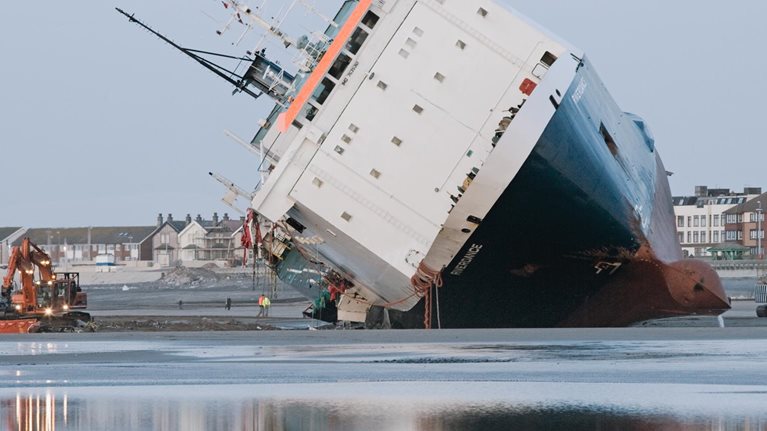In this edition of Author Talks, McKinsey senior partner Scott Blackburn chats with Nate Boaz about his new book, Running Toward Fire: Following the Warrior Path (Barbary Tavern Publishing, May 2024). Boaz is a former Marine Corps captain who shares how he’s conquered danger head-on, his advice for leaders of all types, and how his passion for helping others has continued in his postmilitary life. An edited version of the conversation follows, and you can also watch the full video at the end of this page.
Why did you write this book?
Writing has been my form of therapy for the last 20-plus years. The more I wrote, the more I realized it could help people, so I turned my writing into a book.
As I experienced challenges and crucible life experiences, I had a central question: Why do some go through those types of experiences and grow from them, while others self-destruct? As a business executive, I now realize we all struggle with it. We are busy—all action and no reflection. Instead, we should allow ourselves time to process and work through challenges and traumas healthily, and I hope the book will show people how to do so.
We should allow ourselves time to process and work through challenges and traumas healthily, and I hope the book will show people how to do so.
What can global business leaders learn from Running Toward Fire?
The book is much more than a military memoir; you don’t have to be a war veteran to appreciate the hard-earned trials and triumphs that I’ve had. It outlines lessons from some of the greatest leaders I’ve served under, and those lessons are universal.
The book has a big idea that all organizations can benefit from: you can be a good person in a good organization and do good things during good times. However, that only results in mediocre results. Why is that? When people serve a bigger purpose than them, a true mission, or love something more than themselves, they do extraordinary things.
When people serve a bigger purpose than them, a true mission, or love something more than themselves, they do extraordinary things.
There’s a line in Viktor Frankl’s book Man’s Search for Meaning that resonates with me: “Those who have a why to live can bear almost any how.” That is the lesson I want people to take away from Running Toward Fire.
What valuable lessons did you learn from your grandfathers?
We have a great inheritance from our ancestors that we can tap into. Two valuable lessons that my grandfathers handed down are about character. Both were World War II veterans, and one went on to serve in the Korean and Vietnam Wars, and [continued to serve during] the Cold War.
The first lesson was, “Do something that serves something better than yourself.” That thinking compelled me into a life of service. Before 9/11, I joined an all-volunteer military before going to the Naval Academy during relatively peaceful times. I was encouraged to figure out what “bigger” thing I wanted to do.
It isn’t enough to be a humble, timid leader or a courageous, arrogant leader. You need the courage to be full-hearted.
The second lesson I learned is about the character traits critical for effective leadership. It’s a balance of humility and courage—it’s not enough to have one and not the other. I learned to have the humility to not brag about the past and the courage to not rest on my laurels, remain curious, and recognize that I need other people to achieve amazing things together.
It isn’t enough to be a humble, timid leader or a courageous, arrogant leader. You need the courage to be full-hearted. Courage is being full of heart to step outside your comfort zone, take risks, and do the hard things. That’s what my grandfathers taught me in terms of how to live a good life and how to lead.
Why did 9/11 make you want to serve in the Middle East?
I believe that if you are old enough to remember 9/11, it’s seared into your memory in a way you can never forget. I was in uniform at the Camp Pendleton Marine Corps base in San Diego that day. In that moment, it dawned on me that America and its allies stand for ideals that can only be protected with the willingness of brave men and women who defend and fight for them.
In those moments, those times of crisis, the typical human response is to freeze, ignore what’s going on, and continue doing whatever you are doing. That’s what ultimately led to the book’s title. At that moment, you have a choice. You can run toward the problem. My love for freedom, democracy, capitalism, and people all over the world motivated me to do so.
What was it like to rescue American prisoners of war?
When I reflect on the rescue of seven American prisoners of war, including the first African American woman POW, Shoshana Johnson, I say it was a fantastic team effort, as most things in the military are. Along with it being such inspiring teamwork, it’s also a story that hasn’t been told fully and truthfully. To give some context, we were in the fog of war, and chaos was everywhere. We’d just gone to Baghdad, and we didn’t know where the POWs were. It was likely that they were going to be moved or, even worse, killed.
We didn’t have communications with headquarters or permission to execute a rescue mission. In that moment, we fell on the military’s timeless values. There was no way for us to continue to move without taking the risk of attempting to save our brothers and sisters. We knew we had the opportunity but had minimal time to do so.
I’ve applied the lesson in my life postmilitary: you can have great values on a wall poster within your organization, but the true test is what you do in the most challenging situations. Do you live by those values? Do you truly take them to heart?
What have your near-death experiences meant to you?
The combat I’ve seen resulted in people on both sides being seriously injured or killed, and those experiences have strengthened my resolve to do something meaningful with the remainder of my life.
I recall the battle for Baghdad, a bloody, ten-plus hour fight through the night where more than 80 marines were injured. We dodged rocket-propelled grenades, machine gun fire, and aircraft fire. We were in an unarmored vehicle—one of the only four that were allowed in the siege of Saddam Hussein’s palace in Central Baghdad.
During that fight, I pleaded with God. I promised that if I survived that situation, I would do something good and meaningful in my life. Thankfully, my team and I walked away unscathed, even though our vehicle was bullet riddled. I call it, “Baptism by Fire.”
What life lessons did you learn as a human intelligence officer?
Interrogator training taught me a lesson that has stuck with me, and I’ve carried it into every interrogation and complex negotiation, and the business world. It’s the root perspective that the person sitting on the other side of the table has more in common with you than not. It’s knowing that you are capable of both good and evil. That other person has similar needs, wants, interests, and desires, and with a simple twist of faith, you could be on the other side of the table. It’s a great way to disarm hostility. Staying grounded in common humanity helps move the conversation toward common interests and outcomes. If you treat everyone like your adversary, they will remain your adversary.
What was your reintegration experience?
Arguably, post-9/11, veterans were treated significantly better than Vietnam veterans who returned home in the 1960s and 1970s. I believe that’s primarily due to World War II, Korean, and Vietnam veterans ensuring they welcome veterans who served in Iraq, Afghanistan, and the global war on terrorism. Beyond that, reintegration is very difficult. There are 18 to 19 million veterans in the United States, and many of them, including myself, struggle with slowing down from the fast pace and operational tempo.
I also wrestled with the notion of once working on something meaningful, where people were willing to risk their lives for me, and I would do the same. I was back in a cushy, civilian society where people were much more selfish and superficial. It wasn’t easy to reconcile with that and renew a sense of purpose and selflessness in a world that doesn’t always value it.
What has life looked like after your Marine Corps career?
At first, I wasn’t sure how a professional path would look once I left the military. I decided to enroll in business school, which was an opportunity to reinvent myself and reflect on what I wanted to do next. Then I joined McKinsey, mainly because there was a strong veteran community that trailblazed a path for me. McKinsey helped me take off the uniform, put on the blazer, and start serving clients. However, I did get caught up in “chasing the brass ring.” I did what I thought would get me promoted fast and whatever would foster recognition.
I mention a pivotal moment in the book about my tenure at McKinsey. One of my senior mentors helped me reframe things and realize that life can’t just be about what’s on the other side of the next obstacle or challenge. Instead, life is about enjoying the challenge. That reframing put me on a path of working toward my personal leadership development and transformational change for clients and organizations. I learned an important lesson: you can do the right things for the wrong reasons, and that’s not satisfying.
How should we discuss mental health for veterans and business leaders?
We don’t talk about mental health enough; it needs to be destigmatized, especially among men, specifically business and organizational leaders. Those demographics often carry a disproportionate amount of stress and burden in their leadership positions, which can be lonely and alienating.
The perception is that leaders aren’t vulnerable, don’t ask for help, or discuss their needs. I believe that’s wrong. It takes a lot of courage to admit you need help and even more courage to get help. We should reframe things as a society and permit leaders to seek the assistance they need.
Second, it’s my experience that mental health issues do not discriminate. Mental health doesn’t care where you attended school or how much money you earn if you’re in the C-suite of an organization or an entry-level employee. A mental health crisis can happen to anyone at any time, especially if there’s no focus on building up resilience.
Unfortunately, I know what it’s like to have mental health issues and suicidal ideation. I’ve realized how to work through those issues healthily and that even someone like me, who’s had privileges, opportunities, support, and resources, can still struggle. How many people, not just veterans, are in organizations and don’t have access to the resources they need to proactively work on their mental health and stay out of crisis?
How do you continue to serve in your post-Marine Corps life?
Service is fundamental to our families and communities, and our work and personal interests are essential to human nature. If you don’t know what sets your soul on fire at the deepest level, it’s hard to commit to doing anything. I aim to connect with organizations where I can make a difference through service.
There are numerous veteran service projects, but the one that attracted me the most is Patrol Base Abbate. It’s an organization that is open to millions of US veterans, and it is radically inclusive. The only membership price is that you’ve raised your right hand and swore an oath to defend the Constitution. You don’t have to have been a combat veteran or a decorated war hero. If you signed up and served, you’re in.
Most volunteer organizations only help people who are already in crisis or showing visible warning signs of a mental health crisis. Patrol Base Abbate focuses on being proactive and preventative. The project pulls veterans together to renew a sense of purpose based on their interests. That way, veterans can go back into their communities with the connection they’ve built and a renewed sense of purpose to be better citizens, better moms, better dads, and contributing members of society again. Many who hang up the uniform often lose that purpose. Patrol Base Abbate gives veterans an opportunity to find purpose in a healthy and productive way.
What advice would you give to veterans who are starting a career in business?
I advise veterans to never lose sight of what attracted them to the military and a life of service. My initiative and ability to prioritize others and the mission ahead of self-interests helped me succeed in my McKinsey and post-McKinsey careers.
There’s a tendency to say, “I’m now an individual contributor. I’m an analyst. I’m a consultant.” Instead, don’t lose sight of the tremendous experience and character that you’ve developed. It will serve you well in your career and beyond.



